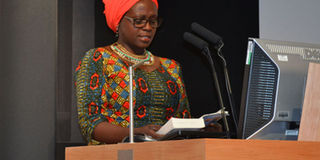Makumbi launches book in UK

Ms Jennifer Nansubuga Makumbi reads a prologue of her novel Kintu during the launch at the British Library in London at the weekend. PHOTO BY Enock Mayanja Kiyaga.
What you need to know:
The book which was first launched in Kampala last month, is Ms Makumbi’s first novel.
LONDON
The audience at the British Library Conference Hall in London listened attentively, with some creeping forward, laughing, clapping and whispering to each other in excitement as Uganda’s Jennifer Nansubuga Makumbi read from the podium, the prologue of her book titled Kintu.
The story is about one of her characters Kamu Kintu, who is brutally murdered by a mob in Bwaise, a Kampala suburb. The majority in the audience, mainly non-Ugandans from across the board, all seemed to enjoy the book and the reading equally.
To Ugandans like me, the reading brought to reality the kind of environment and people I grew up with, the reality of our attitude and perception towards violence and treating suspects as guilty before they are charged, among others, all told in a humorous and dramatic style.
Such was the launch of Makumbi’s debut novel, Kintu, also the winner of the Kwani Manuscript project in London at the weekend.
This was part of the three-day Royal African Society’s annual literature and book festival, which ran from Friday to Sunday at the British Library, UK’s national library in London, under the theme “Africa Writes”.
Bevy of questions
During the 45-minute session moderated by Ms Kate Haines, the associate editor of Kwani? Trust, the publishers, could not accommodate all the questions and interest generated by the book from an audience that comprised mainly a list of “who is who” in the literary world across the globe.
When asked what could have motivated her to write the book, Ms Makumbi said she felt an urge to correct the impressions created about Uganda which she felt were not true. “When I came to Britain in 2001, I could see things being written about Uganda and I would say, that is not the Uganda I know,’’ she said.
Ms Makumbi said she had decided to begin in 1754 mainly because she was interested in writing about Africa before colonialism and to correct the impression created that Africa did not have a history before colonialism.
“There was a lot of history from Buganda which I was playing with,” she said.
“It is incredible how you can find a lot of African history in European libraries but most of it is written from an Eurocentric point of view,” she added.
She said she was concerned that all the Buganda history was told by men, from a man’s point of view.
“Most of Buganda’s oral traditional history is about men. If you look at our legends like Ddungu, Kibuuka Omumbaale and others, they are all men and yet there were equally great women like Nassolo, Nabulya who are not glorified,” she said, adding: “If women had told this story, they would have told it differently,” she added.
Surprised
Asked about her experience of the launch of her book in June in Kampala, Ms Makumbi said: “initially, I had low expectations given the general perception that “Ugandans don’t read” but I was surprised that the book was sold out in just one week. “From my experience, there is no doubt Ugandans read and the only question we should be asking now is, how we get the books to them,” she said.
Prof Abasi Kiyimba, a Makerere University don and Ms Makumbi’s former lecturer, said the negative talk about Ugandan’s reading culture is over exaggerated.
Prof Kiyimba said people who say that compare Uganda with countries that have had more than 20 centuries of reading culture. “Uganda is still in transition from oral tradition to reading which was introduced only one and half century ago,” he said.
After the launch, Ms Makumbi who was smartly clad in full African attire took off time to autograph her book to the people who jammed her desk outside the hall.
About the book
The novel, which takes the reader as far back as 1750, blends Ganda oral tradition, myth, folktale and history, with biblical elements.
It also explores ideas of transgression, curse and perpetuity, looking back at the history of Buganda Kingdom and tracing the birth of modern Uganda.
The novel was launched in Kampala last month.




